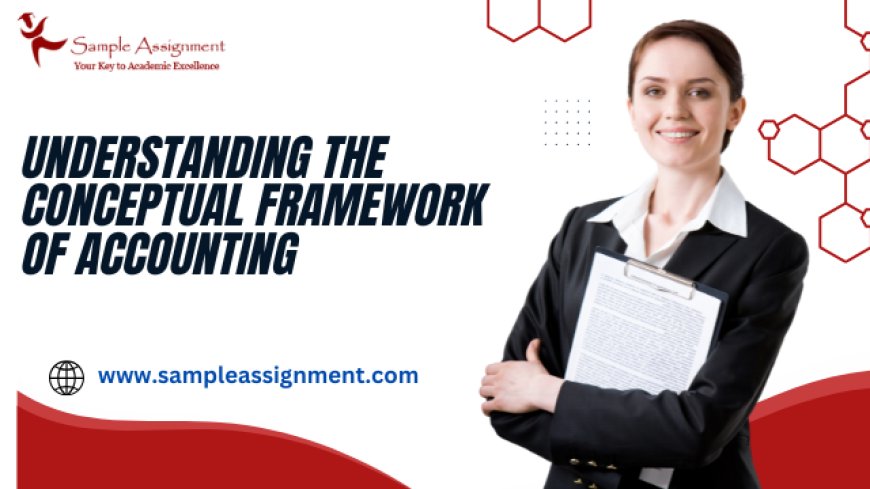Understanding The Conceptual Framework of Accounting
Discover the essential principles and guidelines of the conceptual framework of accounting, its importance, and how it supports accurate financial reporting and decision-making.

The conceptual framework of accounting is the foundation through which financial statements are prepared and ensures consistency, clarity, and reliability in reporting. It guides the development of accounting standards and provides a framework to resolve financial reporting disputes. Below, we have expanded on this topic for better understanding by students and professionals to know its relevance in the accounting field. For students looking for accounting assignment help, understanding the framework is crucial in comprehending accounting principles and their applications in real-world financial reporting.
What is the Conceptual Framework of Accounting?
It refers to a set of interrelated objectives and fundamentals that form a framework of financial accounting and reporting. It essentially seeks to provide a theoretical basis on which accounting principles can be developed and applied. It further ensures that the financial statements are comparable, relevant, and useful for decision-making.
Main Elements of the Conceptual Framework
Below are the prime elements of the conceptual framework:
1. Goals of Financial Reporting
The conceptual framework holds that the fundamental goal of financial reporting is to serve useful users, like investors, creditors, and regulators. It provides information needed in the process of resource allocation as well as in determining whether or not an entity has attained its objectives and for judging its future adequacy.
2. Fundamental Qualitative Characteristics of Financial Information
The conceptual framework specifies two fundamental qualitative characteristics:
Relevance: Financial information should be relevant to the needs of users in making decisions, giving both predictive and confirmatory value.
Representational Faithfulness: Information should be complete, neutral, and free from error to represent the true financial position of the organization.
Secondary qualitative characteristics include comparability, verifiability, timeliness, and understandability. These attributes ensure that financial statements are reliable and transparent, essential for those seeking finance assignment help.
3. Elements of Financial Statements
The conceptual framework provides definitions of the basic components of financial statements, which include assets, liabilities, equity, income, and expenses. Such elements are used as a foundation for preparing financial reports and will be consistent with all organizations.
4. Recognition and Measurement
The framework guides how to identify and measure financial transactions. Items are allowed in the financial statements only if they pass the relevance test and faithful representation. Measurement bases that include historical cost and fair value are also discussed within the framework.
The Role of the Conceptual Framework in Standard-Setting
The framework acts as a guideline to the International Accounting Standards Board in the development of standards and settles conflicts in the application of unclear standards. Accounting assignment help is also given to students for them to understand how the standards apply to financial reporting.
Importance of the Conceptual Framework
The conceptual framework offers the following advantages:
Improves Consistency: A standardized framework ensures that the financial statements of any firm tend to be presented consistently over industries and across countries.
It Enhances Decision-Making: Relevant and credible information improves stakeholders' ability to make good decisions.
Easy Communication: The framework ensures that financial reports are readable and transparent, hence increasing stakeholders' trust.
Challenges and Criticisms of the Conceptual Framework
The conceptual framework is not without its criticisms:
Ambiguity in Application: There is ambiguity in the application of some of the components, for example, measurement bases. This causes inconsistency.
Technicality: The framework is technically written and thus not easily understood by non-accounting professionals.
Evolving Standards: The fast-changing nature of the business environment necessitates changes in the framework from time to time, confusing.
These are some of the challenges that indicate a need for finance assignment help to understand the complexity of the framework and its applications.
Applications of the Conceptual Framework in Accounting
The conceptual framework has practical applications in:
Financial Reporting: Ensuring accuracy, consistency, and transparency in financial statements.
Standard Development: Guiding the creation and revision of accounting standards.
Problem Resolution: Providing a basis for addressing accounting disputes and inconsistencies.
For students, this understanding of applications would help them in doing their assignments and case studies.
How Students Benefit from Understanding the Conceptual Framework
This is one of the critical issues that accountancy students face. With its mastery, a student is enabled to:
Analyze Financial Statements: Know why accountancy policies are applied and how they have affected financial performance.
Solve Real-Life Problems: Relate theory to solving practical problems of accounting.
Perform Exceptionally on Assignments: Utilize the framework in creating an excellent, coherent, and insightful analysis to make an assignment extremely useful for accounting.
Evolutionary Nature of the Conceptual Framework
This does not form a stagnant list of concepts that could easily be frozen in place for good; rather, it shifts along with the global business environment and advances in the state of financial reporting. An example is the movement to value accounting and the integration of sustainability reporting into recent adjustments. These changes help the conceptual framework remain relevant to evolving stakeholder needs. Aspects of change in the areas of accounting need to be updated for the students as well as professionals to better practice them in real-life scenarios. Accounting assignment help in bringing up-to-date knowledge comes in handy.
Future Directions of Conceptual Framework
The more globalized a business is, the elements of cross-border financial reporting challenges are likely to stay in the conceptual framework for accounting. In addition, the increasing focus on reporting under ESG (Environmental, Social, and Governance) could result in further evolution in the framework. It has been observed that these changes mark a significant importance of knowing about the framework as it decides the future of financial reporting. Students and professionals can look ahead of these trends through finance assignment help and take strong footing to excel in accounting.
Conclusion
The conceptual framework in accounting is the backbone of financial reporting, which ensures consistency and reliability in the preparation of financial statements. Despite its difficulties, it so much matters to ensure transparency and comparability. There have always been students who look for accounting assignment help and finance assignment help because of the complexity in this framework and its applications. Whether you are a student or a professional, getting conceptual framework knowledge will certainly heighten your expertise in the study of accounting and finance.
Read Also : Tips and Tricks to Boost Collaboration in Accounting
Read Also : Introduction To Financial Ratios In Accounting And Finance
What's Your Reaction?




















